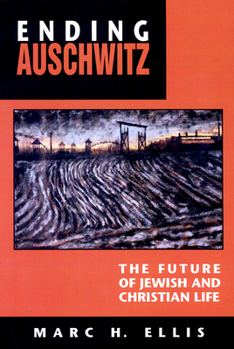Ending Auschwitz: The Future of Jewish and Christian Life
Select Format
Select Condition 
Book Overview
In this book, Marc Ellis wrestles with some of the critical issues of contemporary Jewish and Christian life, in particular the issues of Jewish and Christian religiosity after Auschwitz and 1492, two events that are historical and contemporary in their relevance. Both mark Jewish and Christian religiosity in deep and compelling ways. Ellis does not attempt to offer an exhaustive account of either the Holocaust or 1492 or their political, cultural, and religious consequences. Rather, he attempts to share with the reader a point of view that comes from his own experience of these two events as a Jew born in the first generation after the Holocaust, one who has also experienced some aspects of contemporary Christian life. Recorded here are some of the author's reflections that crystallized on and after what became for him, a journey of endings and, as significant, new beginnings.
Format:Paperback
Language:English
ISBN:0664255019
ISBN13:9780664255015
Release Date:February 1994
Publisher:Westminster John Knox Press
Length:176 Pages
Weight:0.60 lbs.
Dimensions:0.6" x 6.0" x 8.9"
Customer Reviews
2 ratings
Personal, Historical, Political, "Theological"....
Published by Thriftbooks.com User , 21 years ago
This book forms the third in a trilogy including TOWARD A JEWISH THEOLOGY OF LIBERATION and BEYOND INNOCENCE AND REDEMPTION. This is the most personal of the three. Starting and refering back to a trip he made to Auschwitz as part of a conference of scholars. He gives great personal detail as to his own spiritual journey. His deep if complicated relationship with Richard Rubenstein, the author of the now legendary AFTER AUSCHWITZ, which along with Elie Wiesel's NIGHT, initiated "holocaust theology."Along the way he ties Auschwitz with 1492 and the multiple genocides of indigenous peoples since. Reflects on the essential continuity between the "Christ of Faith" and the Constantinian transformation. Attempts to reclaim, insight from the cultural/binational Zionism of Ahad Ha'am, Judah L. Magnes, and Hannah Arendt. Tries to visualize an all inclusive vision of Judaism.Ellis ranges widely, especially considering that the book is only 162 pages long. Needless to say there are omissions and missteps. While focusing on Auschwitz and 1492, Ellis neglects the Crusades as another catastrophic turning point of western history. Not only does the subject bring in Muslim greivance toward Christianity, but the event marked a new outbreak in anti-Semitism that characterized the second millenium, as well as greatly heightened persecution of homosexuals, heretics and "witches." In short, an event at least as great as Constantine.The connection he draws between "the Christ of Faith" and Constantine is just asserted. True, "reformers" are too glib in trying to separate the Church from "abuses." But Ellis, fails to lay out his version of how a group persecuted by empire, became part of the empire and why it was an inevitable development. As for asserting that 1492 "benefitted" the Church. Is this true? Much of the current growth in Asia and Africa is quite indigenous and pentecostalism is the big phenomenon in Latin America. In critiquing the "Christ of Faith" he falls back on Crossan's THE HISTORICAL JESUS as though Crossan presents the last word on "the Jesus of History" (as though such a thing were possible). He seems unaware that his reconstruction of "Jesus as a peasant cynic" is widely disputed. Reconstructions are ever subject to revision and in the end as Schweizer showed, seem to tell more about the author than the subject. As for his all inclusive view of Judaism, he tries to affirm the pagan practices by Ancient Israelites condemned by the "establishment" prophets. Strange that the "establishment" prophets were often the subject of persecution (e.g. jeremiah and isaiah). While the "popular" pagan practices seem to follow courtly fashion.Most troubling is that for a "theology" there is almost nothing said concerning God. (In BEYOND INNOCENCE AND REDEMPTION absolutely nothing is said.) But Ellis's journey is far from over. In just the last few weeks, Ellis has delivered a lecture on "the Prophetic: Hope of God, Hope of Humanity" that embraces and declares t
Well written and challenging to post-shoah theology
Published by Thriftbooks.com User , 25 years ago
Marc Ellis challenges the tradtional Jewish and Christian position on the State of Israel, and its relation to the Shoah. Pointing out that remembering what happened in Nazi Germany is important, but that the role of victim still being played out by many is unhealthy. The call to "End Auschwitz" is a call to put bitterness and resentfulness in the past, and to look to a new future that offers hope. Ellis presents his concerns over the treatment of the Palestinian people by the Israelis, wondering if the desire for a homeland and the desire never to victims again has lead to near genecidal actions and dehumanization. Marc Ellis is definately on the cutting edge of post-shoah theology and is sure to make many people angry while enlightening others. A must read for anyone interested in a viable interfaith dialogue.






